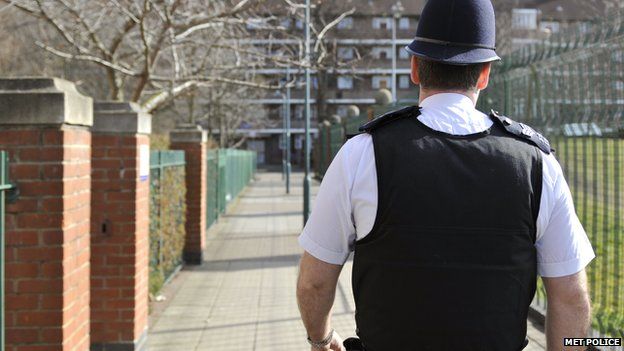Are bobbies on the beat 'endangered'?
- Published

The sight of police officers pounding the streets of England and Wales could soon be a distant memory, the Police Federation has warned.
It says cuts to police budgets of 20% since 2010 have already hit officer numbers and police visibility.
With further savings set to be made over the next five years, is the bobby on the beat - as the Police Federation of England and Wales has claimed - really now an "endangered species"?
Home Secretary Theresa May says that suggestion is wrong and has accused the federation - which represents rank and file police officers - of "scaremongering".
She told its annual conference that although more savings needed to be made over the next five years, cuts could be made without affecting neighbourhood policing.
Have police numbers fallen?
The prospect of future cuts comes as the police workforce in England and Wales - including both officers and staff - has already reduced by 14% since 2010.
According to the latest Home Office statistics, the total in March 2010 was 244,497.
Last year, that figure had fallen to 209,362.
The number of police constables in England and Wales fell by more than 16,000 (11.5%), while police community support officers (PCSOs) reduced by more than 4,000 (almost 25%).
Ch Supt John Sutherland, from London's Metropolitan Police, said the current climate was "as challenging as I've ever known it".
He said the Met had already cut about £600m and may have to save "at least the same again".
Potential savings were "eye watering", he said, adding that there were some things the force would "unequivocally" have to do differently.
Yet, despite the cut, according to official figures recorded crime has continued to fall.
Do we need beat bobbies?
John Graham, director of the Police Foundation think tank, stressed the importance of neighbour police teams in building "trust and confidence" with local residents.
Reducing the visibility of local officers could quickly erode that trust, he warned.
A report he co-authored - which was published this week - suggested that if neighbourhood policing reduced then "policing by consent may well go with it."
"If you lose the trust and confidence of the public you are policing then why should they give you their consent?" Mr Graham said.
He said the idea that neighbourhood policing would disappear altogether was "nonsense", but said the concept might have to change.
"There will be fewer people available to patrol local neighbourhoods, but I think one has to bear in mind that as the nature of crime is changing the requirements of local patrols is also changing," he said.
How are police forces coping?
Solutions vary between forces.
A survey by the Police Federation suggests 33 out of the 43 forces have scrapped, reduced or merged their neighbourhood policing teams since 2010.
Many chief constables have been trying to recruit more volunteer special constables.
In Leicestershire, remaining neighbourhood officers will no longer investigate crimes or respond to emergencies.
Instead, they will only deal with "core community activities", such as patrol, dealing with anti-social behaviour and engaging with people, Mr Graham added.
Could fewer police be a good thing?
Richard Garside, director of the Centre for Crime and Justice Studies, argued there should be fewer - not more - police officers.
He said police budgets in 2010 - when police officers were at "record numbers" - had grown by around 50% over the previous decade.
At the same time, he argued, there was a "mission creep" in the functions police forces carried out - notably, he said, acting as probation officers and dealing with the mentally ill.
"One of the reasons I think the police feel a lot of pressure now is they are being asked to do a lot more than historically could or should be the role of the police."
Mr Garside said the key question was about how police officers were deployed.
"What we've had from the government over the last five years this notion that you can get more for less", he said.
"I think one of the things we need to be talking about in the next five years is how do we get less for less.
"We just accept that if we reduce budgets - which I think is a good thing in relation to the police - we have to also accept that police aren't going to do as much."
What does the government say?
Policing Minister Mike Penning said decisions on neighbourhood policing should be made locally by chief constable and police and crime commissioners - not by the government.
He added: "The reduction in crime seen nationwide demonstrates there is no simple link between officer numbers and crime levels, the visibility of the police in the community and the quality of service provided."
- Published20 May 2015
- Published20 May 2015
- Published20 May 2015